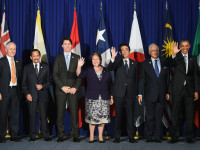Appeared in the Toronto Star on November 23, 2015 as Paris Attacks Put Canada’s Internet Privacy Laws At Risk As the world grapples with the recent terrorist attacks in Paris, the policy implications for issues such as the acceptance of refugees and continued military participation in the fight against ISIL […]
 Articles by: Michael Geist
Articles by: Michael Geist
Why the Supreme Court’s Endorsement of Technological Neutrality in Copyright May Be Anti-Technology
The Supreme Court of Canada issued its long-awaited decision in SODRAC v. CBC today, a case that has major implications for the role of technological neutrality in copyright. As I noted when it was argued before the court, though the case was about whether CBC should be required to pay royalties for incidental copies necessary to use new broadcast technologies, at stake was something far bigger: the future of technological neutrality under Canadian copyright law. The case offers wins and losses for both users and creators, but the manner in which the court strongly affirmed the principle of technological neutrality runs the risk of actually undermining technological adoption.
Signing vs. Ratifying: Unpacking the Canadian Government Position on the TPP
The official release of the Trans Pacific Partnership (TPP), a global trade agreement between 12 countries including Canada, the United States, and Japan, has generated considerable confusion over where the Trudeau government stands on the deal. The TPP was concluded several weeks before the October election and the Liberals were careful to express general support for free trade, but refrain from embracing an agreement that was still secret.
Over the past month, there have been mixed signals over the issue. Chrystia Freeland, the new Minister of International Trade, has committed to a public consultation and noted that her government is not bound by commitments made by the Conservatives (in the interests of full disclosure, I had the opportunity to meet with Minister Freeland to discuss the TPP earlier this month). Yet following a meeting between Prime Minister Justin Trudeau and U.S. President Barack Obama at the APEC conference in Manila, Obama indicated that he expects Canada to soon be a signatory to the deal.
How to explain the seemingly inconsistent comments on the Canadian position on the TPP? The answer may well lie in the differences between reaching an agreement-in-principle, signing the formal text, and ratifying the deal. Each step is distinct and carries different legal obligations.
Why the TPP is a Canadian Digital Policy Failure
The official release of the Trans Pacific Partnership (TPP), a global trade agreement between 12 countries including Canada, the United States, and Japan, has sparked a heated public debate over the merits of the deal. Leading the opposition is Research in Motion founder Jim Balsillie, who has described the TPP as one of Canada’s worst-ever policy moves that could cost the country billions of dollars.
My weekly technology law column (Toronto Star version, homepage version) notes that as Canadians assess the 6,000 page agreement, the implications for digital policies such as copyright and privacy should command considerable attention. On those fronts, the agreement appears to be a major failure. Canadian negotiators adopted a defensive strategy by seeking to maintain existing national laws and doing little to extend Canadian policies to other countries. The result is a deal that the U.S. has rightly promoted as “Made in America.” [a video of my recent talk on this issue can be found here].
Why the TPP is a Digital Policy Failure for Canada
Appeared in the Toronto Star on November 15, 2015 as TPP Will Kill Digital Policy The official release of the Trans Pacific Partnership (TPP), a global trade agreement between 12 countries including Canada, the United States, and Japan, has sparked a heated public debate over the merits of the deal. […]









